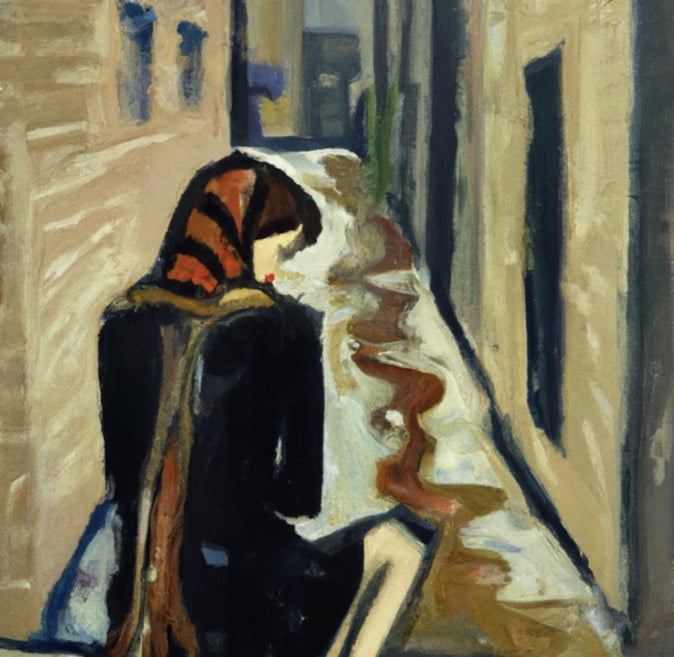Table of Contents
Being the Asian woman who doesn’t fit in
Not all Asian women want to be a lawyer, doctor, or accountant.
Not all Asian women want to bleach their skin with or stay stick-thin.
Not all Asian women want to be married by 30.
Not all Asian women are quiet and submissive.
Some people could live their whole lives according to a script that has been handed down to them, but that is not for anyone.
In many East Asian cultures, including those in China, Japan, Vietnam, Korea, Taiwan, Singapore and Malaysia, the social pressure to conform is huge. Being hierarchical and collectivistic (as opposed to ‘individualistic’), these cultures value conformity above individuality. People are pressured to do all they can to maintain the status quo, or outer harmony, even at the price of individual autonomy, voice or needs. This expectation is reflected in the Japanese expression: “The nail that sticks up gets hammered down ( “出る釘は打たれる”)” In other words, we should all act like other people, not stand out, and not be different. For women, in particular, there are many unwritten rules: girls should be girls, they need to look a certain way, study in specific fields, marry a specific type of person and by a certain age.
But not all Asian women neatly fit into these criteria.

*
Rigid social standards can be abrasive and coercive for all women, but they are especially challenging for the innately intense and sensitive ones.
From a young age, she hasa strong urge to rebel against imposed manners, taboos and limits. As a teenager, she could see through the tactics, manipulations, guilt trips that are designed to control, rather than provide any real benefits.
It is not that she intentionally tries to make things complicated, but her perceptiveness, curiosity, and drive mean that she naturally stands out, and attracts the labels of being the ‘maladjusted rebel,’ the black sheep of the family, or the ‘trouble-maker’ in class.
Throughout her life, the non-conformist Asian woman is repeatedly invalidated for her ways of thinking, feeling and being in the world. As she makes independent choices that do not conform to the norm, she also experiences guilt, a deep fear of disapproval, or even alienation. And when it gets too painful, she might give up and silence herself.
As she moves through life, however, she continues to struggle with the battles between two voices. When the family-pleasing, society-conforming self asks, “What do they want?”, the true self asks: “What makes my heart sing?” When the gap between the two becomes too broad, she would no longer be able to hold both together. That is when life — kindly but forcefully— invite her to forgo the safe and well-worn path and take a plunge into the unknown.
Here are some of the everyday struggles faced by the Asian woman who does not fit in.
What if I don’t want to be a lawyer, accountant, or doctor?
This might be a gross generalization, but Asian parents tend to be great providers for their children’s physical needs but pay scant attention to their emotional state or feelings. Research in the field of psychology finds that Asian parenting is more likely to be “authoritarian”— a style that emphasizes high standards but a lack of emotional warmth, rather than“authoritative” parenting, which also emphasizes high standards, but is supplemented by high levels of warmth and discussions that help the child understand the rationale behind discipline.
The 2011 bestseller, Battle Hymn of the Tiger Mother, has become a phenomenon because so many have related to, or were shocked at, what the author Amy Chua described as her childhood: No play dates, no TV and having to always be #1 in everything; moreover, shaming, withdrawal of affection, and harsh criticism are common practices. While Amy Chua presents the Tiger Mother way as ‘superior,’ most research suggests otherwise. ‘Helicoptering,’ harsh and perfectionist parenting undermine children’s confidence and self-esteem; and those children tend to develop more aggression and depression and have poorer social skills. Unfortunately, the wounds of growing up with a ‘Tiger Mum’ are often swept under the carpet in an Asian community, as harsh parenting is glorified as being ‘for your own good.’
In most cases, Asian parents do have their children’s best interests at heart, and research shows that some children do respond well to authoritarian parenting and become high-functioning, well-adjusted adults. On other occasions, however, parents might have ‘used’ their children in an unhealthy way to fulfil their own emotional needs. For example, parents who feel unfulfilled in their own lives may see their daughter as an extension of themselves, and see all of her behaviours or outward achievements as a reflection of them.
It is a painfully familiar stereotype: Asians tend to be forced into pursuing the STEM (Science, Technology, Engineering, and Mathematics) subjects, regardless of their interests, often due to the parents’ narrow definition of success. When she performs well according to parental expectations, she is crowned the “trophy” child, the golden girl, so she learns to build her self-esteem based on external achievements and to manufacture an identity that is carefully tailored to parental demands. If the creative girl wants to do something else, she is dismissed as being an unrealistic, idealistic, or even ‘spoilt’ dreamer. Whatever interests there are in the arts, humanities, music and other ‘impractical’ fields are to be buried. Even as she grows older, she remains a planet in orbit, circling the ‘mother sun.’ Since all the love that she has received has been conditional, she might also find it difficult to take in genuine love, or to trust others in an intimate relationship. And because she had little room to explore her inner self during childhood, she might grow up feeling unsure about her likes and dislikes, confused and empty on the inside.

“Being an Asian woman is like being a lotus flower, blooming amidst the muddy waters, embodying both fragility and unwavering beauty.”
Am I not beautiful enough, thin enough.. etc?
Although the tyranny of beauty ideals is experienced across history and cultures, Asia has a particularly narrow standard of beauty for women. It could be summarised as follows: a tall and thin body, big eyes, a watermelon seed-shaped face, fair skin, a straight, small nose, and pale, poreless, and porcelain skin. On top of all that, girls should also embody ‘qi zhi’— roughly translated as ‘inner beauty,’ or ‘refined disposition,’ it is a word often used to evaluate, and regulate women’s ways of speaking and behaving. Words like “aegyo” in Korean, “kawaii” in Japanese and “Manja” in Malaysian also convey that women of all ages are to be held to a feminine standard of cuteness, softness, and submissiveness.
Most women in Asia are pressured to go to great length to achieve a rigid standard of beauty, even to the detriment of their health. A 2004 survey (Synovate) of 2,500 women in Hong Kong, Korea, Malaysia, the Philippines and Taiwan found that 38 percent used skin-bleaching chemicals. Unknownst to many is that these ‘whitening’ products contain hydroquinone, a pigment-altering agent that has been linked to cancer. Plastic surgery is also common; Liposuction, nose jobs, calf-reduction surgery, and double-eyelid surgery are amongst the most popular procedures. In countries like South Korea, where the pursuit of beauty is not a luxury, but an expectation, it was estimated that between one-fifth to one-third of women have had plastic surgery.
In Asia, both eating and body shape are not private, but public issues. The Asian girl is often trapped in a double bind: She is on the one hand being pressured to eat and fat-shamed on the other.
Despite the dramatic rise of eating disorders across nations, the pressure to be thin is a big part of the narrow standard of beauty. Advertisements for slimming centers and treatments bombard women in media, ads, and billboards. One could hardly escape the cultural code that dictates – literally- how much space women are allowed to take up in public.
The irony is that Asian girls are also pressured to eat. At the Asian dinner table, eating is almost a filial duty, rather than an organic process; “Eat this” is a common instruction over the dinner table in Chinese and Filipino cultures. An abundance of food defines most family gatherings, celebrations and festive occasions. This double-bind is vividly captured on the Thick Dumpling Skin campaign website: “We all have families who tell us what to eat when to eat, and extended families who make plenty of unsolicited comments about our food. They tell us we’ve overeaten, too little, and too much again. One day we’re too skinny. And within a matter of days, we’re too fat. No matter what we’re told, we’re always offered seconds. And thirds. We are afraid to offend, so we oblige and take fourths. Sometimes we pretend we’ve already eaten. Merely saying “No thank you” – and being heard – isn’t a realistic option.“
In Asia, fat-shaming is common, especially amongst family members. Since weight and appearance is not a taboo subject in public, it is almost normalized to comment on one’s weight without tact or political correctness. “You look like you have gained weight” is commonly heard at family gatherings; and since the comment often comes from someone senior, one is not ‘supposed’ to stand up to it. Blogger Jennifer Chen has described this phenomenon well: “at any family gathering, conversations often revolve around who has gained weight and who has lost weight. So-and-so used to be so cute as a kid, but now they’ve gained a lot of weight.”
The more resilient girl might have stood her ground, and modeled self- confidence despite not fitting the model standard. Not everyone, however, has immunity against the paramount pressure and daily erosion of judgment, unsolicited comments, and invalidation. Symptoms such as obsessive dieting, self-hate, compulsive eating, and body dysmorphia only skim the surface of what the rigid beauty standard does to Asian women.
What if I am still not married by 30?
The modern Asian woman is expected to tick a list of boxes not to be considered a ‘failure.’ Grossly speaking, by 30, she ought to: be in a stable job (with a large corporation that offers maternity leave and benefits); have a boyfriend that is taller, older and earns more money than she does, and have him approved by her parents and ideally the extended family; have been around the world and be able to speak English well, but have travelled enough to be ready to come home and take care of elderly parents; have a mortgage, or marry someone who does. On top of all this, she must still look young and beautiful, or at least enough to attract someone to have babies with.
Although things are slowly changing, many women are still made to believe that they have an ‘expiry date.’ In Japan, unmarried women 25-years-old or older are called the “Christmas cake’: Buying a cake for Christmas is a Japanese tradition, but no one wants to eat it after December 25th. The label implies that these women have passed the ‘freshness’ of their youth and are therefore un-marriageable. Similarly, in China, those who do not have a husband by the age of 27 are called “leftover women,” with ‘diminishing value in the dating market.’ Such degrading notions can seriously erode a woman’s self-esteem, especially when she has reached a certain age and is not living in accord with the prescribed timeline.
Asian women are celebrated for their compliance, adaptability, gentleness and youthful sweetness. They are taught to play the femme fatale, the dutiful daughter, and the charming wife, but not to be assertive or ambitious in their career. Many Asian girls have grown up with Disney stories; In these fairy tales, women are either the helpless damsels or the ‘eternal girl’— both Sleeping Beauty and Cinderella ultimately needed to be saved by their princes. In other words, the implicit cultural script says that a woman’s success is at least half dependent on her spouses’ resume.
Like many women across the world, the ambitious young Asian woman believes that she can either be a successful career woman or a sweet housewife, but not both. As she climbs up the career ladder, she feels that she has to sacrifice either her relationships or her aspirations. In fact, even when she tries to overcome this obstacle, the sexism and gender inequality that permeates the workplace does not lay a smooth path. In Japanese business, for example, there’s a term called “ochakumi.” It means “tea squad,” and it refers to lower-ranking female office workers who are expected to make and serve tea to their male coworkers and company superiors.
Under these family and social pressures, many ambitious young Asian women have resorted to living vicariously through men, by being, for instance, the muse to the artist, the highly efficient assistant, or the nurturing homemaker in the background. However, they may one day wake up to the realization that it is not enough to exist as a +1 or just as the enabler of someone else’s wishes and projections. The shock of seeing how one’s life is not her own can trigger a profound existential crisis.

Have You Been Called to Break Free?
Some people could live their whole life according to a script that has been handed to them, but that is not for everyone. Our souls naturally have an undeniable longing for authenticity and wholeness. As we psychologically and spiritually grow, we will experience more and more invitations from life, pushing us to become more of who we are. These invitations often start as unwelcome guests: Boredom at work, the breakdown of a long-term relationship, dissatisfaction with life, a lack of motivation…If we continue to ignore the messages from our soul, sooner or later, great distress will rise to trouble us, perplex us, or confuse us. Although we seldom welcome this challenging path without resistance, when the insurgence of our soul happens, we may not have a choice. As Jesus said in the Gospel of Thomas, ‘ If you bring forth what is within you, what you bring forth will save you. If you do not bring forth what is within you, what you do not bring forth will destroy you.” Moving forward we must be the one who decides and designs the value system we live by.
Carl Jung said that to achieve self- actualization, we ought to go through the process of individuation— when we are brave enough to contribute our unique, idiosyncratic, and not-fitting-in-fully selves to the world. As natural cycles of life go, we must deconstruct our current form to recreate something new. In a way, we must die (Ego Death) to be reborn. Alongside our job titles, relationships and career trajectories, we also need to release certain beliefs, future visions, and ideas about who we thought we were.
When life throws us an existential crisis, instead of panicking, we could pause, and gently ask ourselves these questions:
Whose stories am I living?;
Am I living my parents’ unlived lives, compensating for their fears?;
Am I simply going along with the values of the herd, of the cultural ‘shoulds’?
Spiritually, we could ponder:
Who am I really, without these roles?;
What would I be, without my history and the assigned scripts?
Despite what our cultural conditioning has led us to feel, going against the herd is not a selfish act. As we move towards authenticity, what we actualize along the way are gifts to the public and collective life. Being able to thrive as who we are, even when it means that for a while we stand on the fringes of society, we open doors for all the creative, intelligent and sensitive girls who come after us. Ultimately, it is a courageous and noble act.
Imi Lo is an independent consultant who has dedicated her career to helping emotionally intense and highly sensitive people turn their depth into strength. Her three books, Emotional Sensitivity and Intensity, The Gift of Intensity, and The Gift of Empathy, are translated into multiple languages.
Imi holds three master's degrees in Mental Health, Buddhist Studies, and Global Cultures, alongside training in philosophical counseling, Jungian psychology, and other modalities. Her multicultural perspective has been enriched by living and working across the UK, Australia, and Asia, including with organizations such as Médecins Sans Frontières/Doctors Without Borders and the NHS (UK). Throughout her career, she has served as a psychotherapist, art therapist, suicide crisis social worker, mental health supervisor, and trainer for mental health professionals.
You can contact Imi for a one-to-one consulting session tailored to your specific needs.
